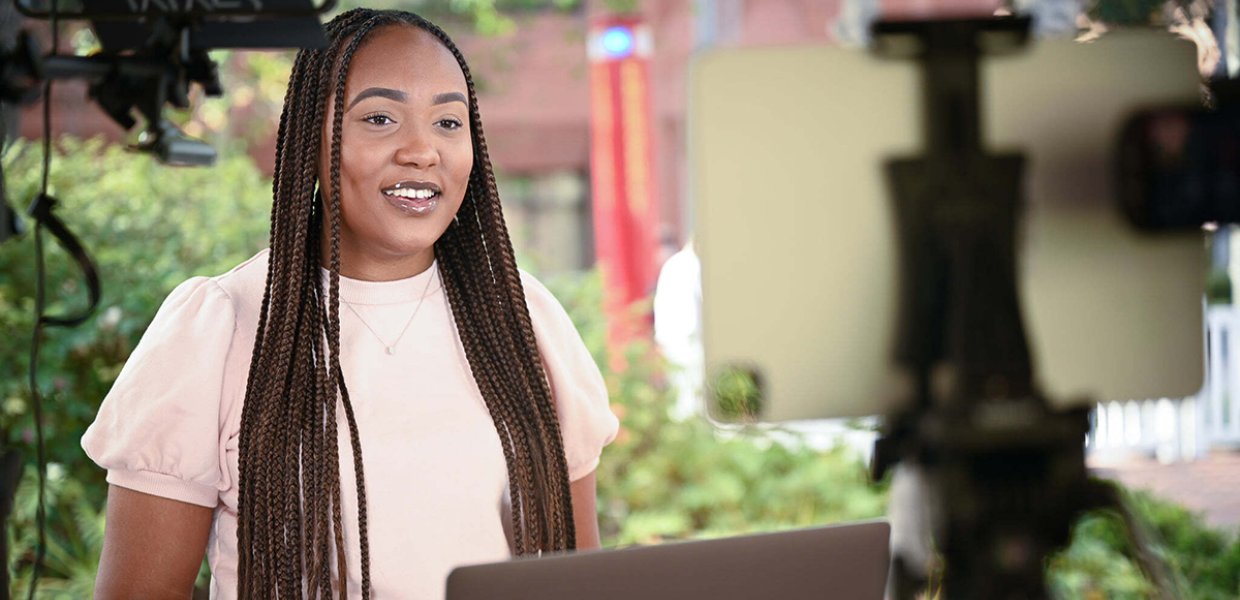Amid increasing calls to restrict curricula that engage critical race theory in American classrooms, award-winning journalism instructor and scholar Allissa V. Richardson has founded the Charlotta Bass Journalism & Justice Lab at the USC Annenberg School for Communication and Journalism to preserve Black media and amplify Black media makers, activists and social changemakers.
As the University of Southern California’s first media studies center dedicated to saving, studying and sharing the work of prominent and hidden figures who have been central to Black social justice movements in America, the Bass Lab will create a web archive that serves as a repository for Black media and activist journalism. The archive will include digitized newspapers, magazines, photojournalism and scanned 3D objects that tell the story of Black life and culture on the West Coast. Original content in the form of recorded interviews and oral histories will also be featured.
“The Bass Lab’s pioneering mission bridges traditional journalism with innovative media-making technologies to capture and preserve the many voices of the racial and social justice movements,” USC Annenberg Dean Willow Bay said. “It will undoubtedly become a primary destination for Black media makers, scholars and journalists.”
Richardson, the bestselling author of Bearing Witness While Black: African Americans, Smartphones and the New Social Justice #Journalism, will serve as the lab’s inaugural director.
“When most people think of civil rights, they don’t tend to think of Washington, Oregon and California as hotspots for Black activism — but the Black Press tells us a different story,” said Richardson, associate professor of journalism and communication. “For the first time in history we are building a clearinghouse that will aggregate Black social justice journalism — in all of its formats – while uplifting the voices of the people who made it.”
The Bass Fellowship, which aims to increase the industry pipeline of talented journalists who are prepared to report on issues of race and social justice, will be the lab’s first academic initiative. Select USC students will be trained to produce original audio, video and photographic content and hone their skills in news-gathering, photogrammetry, drone photography and podcasting. Such content will be collected and curated for the Lab’s website, its forthcoming mobile app and the Voices of a Movement “virtual humans” exhibit, which will be presented on USC’s University Park campus during Black History Month in February 2023.
The virtual humans concept was pioneered by the USC Shoah Foundation through its Dimensions in Testimony exhibit. Dimensions allows visitors to “speak” with survivors of the Holocaust through advanced recording and display technology. When people ask a virtual human a question onscreen, the software retrieves the appropriate video snippet from a previously filmed interview, as a reply.
“During the last two years, Black America has lost so many of its history makers — from civil rights leaders, such as Rep. John Lewis and CT Vivian, and socially conscious actors, like Nichelle Nichols and Cicely Tyson,” Richardson said. “There has never been a more imperative time to capture the voices of Black icons who are still with us. When we honor them, we help future generations connect the dots between social movements.”
The Bass Lab has been named in honor of Charlotta Spears Bass, the first Black woman to be nominated as vice president for a major political party in America. Bass was also the first Black woman to own and operate a newspaper on the West Coast. The California Eagle debuted in 1912 and is credited with sparking a mass migration of Black people from the American South and Midwest who sought promise and opportunity in California.
“Charlotta Bass’ pioneering leadership and tireless advocacy for Black people helped establish the culture and makeup of the West Coast that we experience today. Our goal for the lab is to highlight the stories of those who carry on this legacy,” said Myah Genung, the lab’s chief program officer.
The Bass Lab’s efforts will also include collaborating with various media industry partners to develop academic and experiential programming that will reflect its mission.
